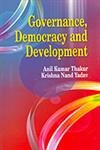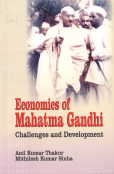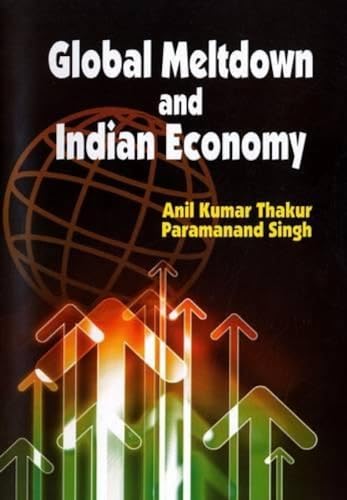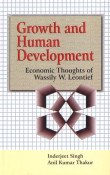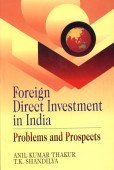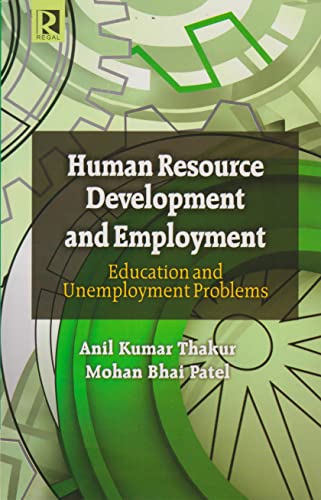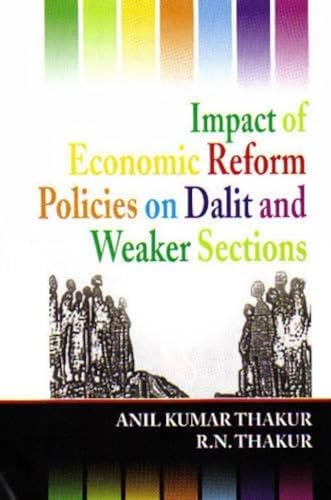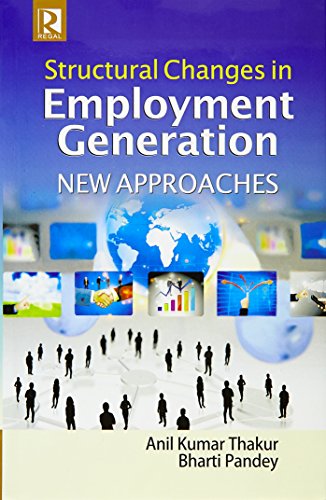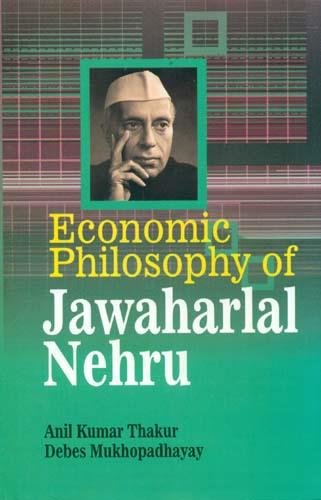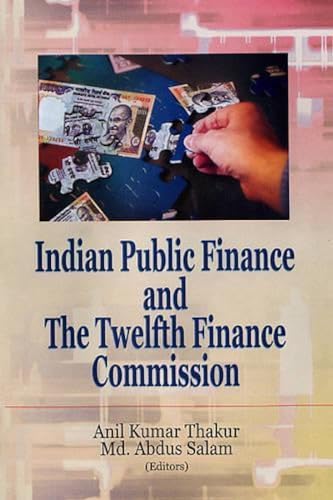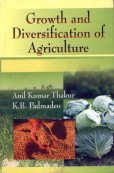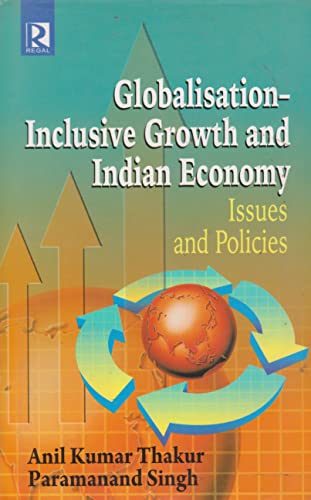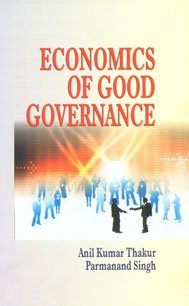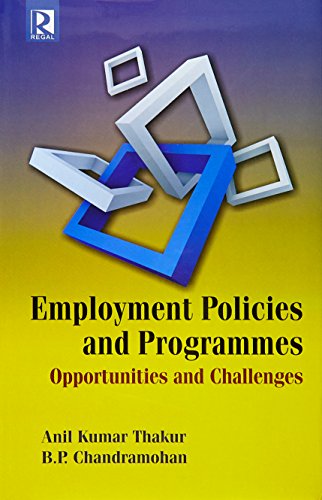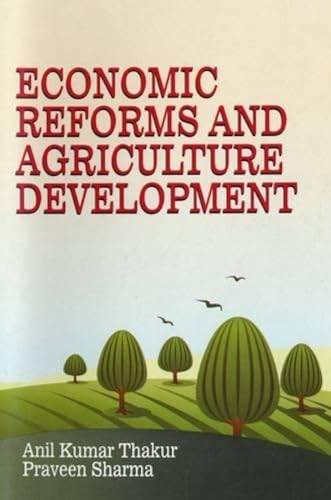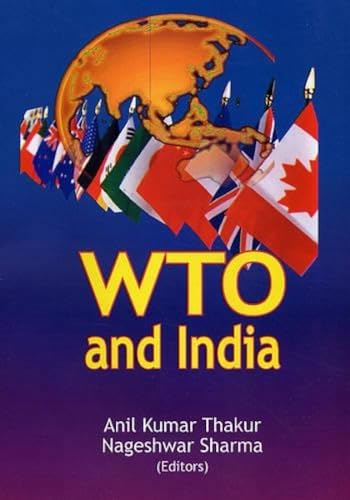Thakur Anil Kumar (124 results)
Product Type
- All Product Types
- Books (124)
- Magazines & Periodicals
- Comics
- Sheet Music
- Art, Prints & Posters
- Photographs
- Maps
-
Manuscripts &
Paper Collectibles
Condition
Binding
Collectible Attributes
Free Shipping
Seller Location
Seller Rating
-
Governance Democracy And Development
Published by Balaji World of Books, 2009
ISBN 10: 8184501625ISBN 13: 9788184501629
Seller: GreatBookPrices, Columbia, MD, U.S.A.
Book
Condition: New.
More buying choices from other sellers on AbeBooks
New offers from US$ 12.36
Used offers from US$ 21.45
-
Economics of Mahatma Gandhi
Published by Deep & Deep Publications 2009-08-30, New Delhi, 2009
ISBN 10: 8184501587ISBN 13: 9788184501582
Seller: Blackwell's, London, United Kingdom
Book
hardback. Condition: New. Language: ENG.
More buying choices from other sellers on AbeBooks
New offers from US$ 11.78
-
Global Meltdown and Indian Economy
Published by Deep & Deep Publications 2011-04-30, New Delhi, 2011
ISBN 10: 8184503547ISBN 13: 9788184503548
Seller: Blackwell's, London, United Kingdom
Book
hardback. Condition: New. Language: ENG.
More buying choices from other sellers on AbeBooks
New offers from US$ 13.30
Used offers from US$ 57.01
Also find Hardcover
-
Asian Economic Integration
Published by Deep & Deep Publications 2008-05-01, Delhi, 2008
ISBN 10: 8184500580ISBN 13: 9788184500585
Seller: Blackwell's, London, United Kingdom
Book
hardback. Condition: New. Language: ENG.
More buying choices from other sellers on AbeBooks
New offers from US$ 15.47
Used offers from US$ 41.25
Also find Hardcover
-
Active Tectonics of Kumaun and Garhwal Himalaya (Springer Natural Hazards)
Published by Springer, 2018
ISBN 10: 9811082421ISBN 13: 9789811082429
Seller: Cotswold Rare Books, OXFORDSHIRE, United Kingdom
Book First Edition
Hardcover. Condition: New. 1st Edition. Brand new copy.
More buying choices from other sellers on AbeBooks
New offers from US$ 25.47
Used offers from US$ 60.48
Also find Hardcover First Edition
-
Growth and Human Development : Economic Thoughts of Wassily W. Leontief (Reprint)
Published by Deep and Deep, 2018
ISBN 10: 8184500416ISBN 13: 9788184500417
Seller: Vedams eBooks (P) Ltd, New Delhi, India
Book
Hardcover. Condition: New. Contents: Preface. Introduction. List of contributors. I. Leontief economics: 1. Leontief's input-output economics in retrospect/Shri Prakash. 2. Professor Wassily W. Leontief: life and works/Inderjeet Singh and Reena Singh. 3. On demand and supply driven input-output models/Biswajit Chatterjee and Ram Pratap Sinha. 4. Wassily Leontief's life and input-output analysis/V. Anbumani and M. Saravanakumar. 5. Indian contributions to Leontief's input-output economics/Shalini Sharma. II. Human development: 6. Human development index in input-output framework: an alternative approach/Shri Prakash. 7. Education in human development index of India/R. Hemalatha. 8. Input-output modelling of employment and productivity as a base of economic growth/Shri Prakash and Brinda Balakrishnan. III. Structure and structural change: 9. A simulation exercise on the Sri Lankan economy in the Keyens-Leontief Klien framework/Partha Pratim Ghosh, Arpita Dhar and Debesh Chakraborty. 10. Structural analysis of the Indian economy in the conventional and augmented input-output frameworks/Pramita Dasgupta and Debesh Chakraborty. 11. Structural analysis of the Indian economy in input-output framework/Vijay S. Sathe. 12. The structure of the Orissan Economy: an input-output analysis/Aditya Kumar Patra. IV. Environment and international trade: 13. Economic thoughts of W.W. Leontief with special reference to environment/Pushpa Ranade. 14. Environmental analysis: an input-output approach/B.P. Chandramohan. 15. Service sector dynamics in India: using Leontief approach/Inderjeet Singh, Parmod Kumar and Anju Bansal. 16. The relevance of Leontief Paradox in modern international trade/Deepa Rawat and Shyam Sunder Singh Chauhan. Index. "The Indian Economic Association (IEA) organizes its Annual Conference every year. A conference volume containing papers on all themes of the conference is published and distributed to its members. These themes are debated at length in the conference. After the conference, IEA publishes them-wise volumes in the form of books. IEA held its Eighty-Ninth Annual Conference at Kurukshetra University, Kurukshetra, Haryana. This publication is based on the contributions made to the conference theme: 'Economic Thoughts of Wassily W. Leontief'." (jacket).
-
Environment and Economic Development
Published by Regal Publications, 2012
ISBN 10: 8184841515ISBN 13: 9788184841510
Seller: Books Puddle, New York, NY, U.S.A.
Book
Condition: Used. pp. xxiii + 452.
More buying choices from other sellers on AbeBooks
Used offers from US$ 39.79
-
Interlinking of Rivers in India : Costs and Benefits (Reprint)
Published by Deep and Deep, 2020
ISBN 10: 8176299596ISBN 13: 9788176299596
Seller: Vedams eBooks (P) Ltd, New Delhi, India
Book
Hardcover. Condition: As New. Dust Jacket Included. Contents Preface. Introduction. 1. Interlinking of rivers in India objectives and plans/G. Karunakaran Pillai. 2. A bird's eye view on interlinking of rivers in India/Narendra Prasad. 3. Interlinking of Indian rivers a viewpoint/Shashi Bala Jain. 4. Does river linking imply investment in natural capital/Nirmal Chandra Sahu. 5. Interlinking of rivers need of the hour/Krishna Nand Yadav. 6. Interlinking of rivers in India an appraisal/Kuldip Kaur and Kushwinder Kaur. 7. Interlinking of rivers challenges of destiny/Ram Naresh Thakur. 8. Interlinking of rivers in India rationale benefits and costs/P.N. Sharma and Anju Kumari. 9. Interlinking rivers in India costs and benefits/V. Madhava Rao. 10. Interlinking of rivers in India justification benefits and costs/Tapan Kumar Shandilya. 11. Feasibility of interlinking rivers/Nidhi Sharma. 12. Interlinking of rivers a feasibility study and an alternative plan/V.P. Tripathi and Arun Bhadauria. 13. Modelling of rivers networking under cost framework/Kumar Ratnesh. 14. Linking rivers from dividend to disaster/A. Ranga Reddy K.H. Reddy and P. Subramanyachary. 15. Interlinking of rivers in India dream or reality/B. Syamala. 16. Interlinking of Indian rivers a big dream of little logic/Manju Singh and Divya Singhal. 17. Water crisis in India is linking of rivers a solution/A. Munian. 18. Expansion of irrigation and rural development the socio economic relevance of interlinking of rivers/A.R. Veeramani and K. Ramesh. 19. Flood control and interlinking of rivers/A.K. Choudhury and N.C. Sahu. 20. Problems and prospects of interlinking of rivers in India/Bikrama Singh. 21. Interlinking of rivers in India problems and prospects/H.H. Uliveppa and M.N. Siddingappanavar. 22. Interlinking of Indian rivers interstate water disputes/Anju Kohli. 23. Linking of major rivers the case for mighty Brahmaputra/Debotpal Goswami. 24. Interlinking of rivers a case study of Mahadayi and Malaprabha in the Western Ghats/S.S. Masali and V.V. Karjinni. 25. Mahanadi Godavari basin link a benefit analysis/Sandhyarani Das and R.P. Sarma. 26. Economic thought on dryland farming in India/S. Rengarajan. Index. Interlinking of Rivers in India is an addition to the series of title arising out of IEA theme wise conference papers. The present volume consists of 25 articles contributed for the eighty seventh IEA conference at Varanasi. These articles present the considered view on interlinking of rivers in India by the members of the Indian economic association who come from different parts of the country. The volume therefore presents the opinion and wide spectrum of views of our distinguished members. The volume reflects aspects like evaluation of the concept the present framework rationale of the plan socio economic problems and prospects and cost and benefits etc. of interlinking of rivers in India. The book throws sufficient light on the interlinking of rivers in India which may be helpful for researchers policy makers as well as planners for its better understanding and implementation. 342 pp.
-
Inclusive Growth in India
Published by Deep and Deep Publications, 2009
ISBN 10: 8184501633ISBN 13: 9788184501636
Seller: PBShop.store US, Wood Dale, IL, U.S.A.
Book
HRD. Condition: New. New Book. Shipped from UK. Established seller since 2000.
More buying choices from other sellers on AbeBooks
New offers from US$ 44.77
Used offers from US$ 71.96
Also find Hardcover
-
Economic Thoughts on Justice and Equity
Published by Deep and Deep, 2007
ISBN 10: 817629960XISBN 13: 9788176299602
Seller: Vedams eBooks (P) Ltd, New Delhi, India
Book
Hardcover. Condition: As New. Dust Jacket Included. Contents Foreword. Acknowledgements. Abbreviations. Introduction. 1. Intergenerational equity and neoclassical growth theory/Nirmal Chandra Sahu. 2. Justice and equity in economic thought myth or reality/Ratan Lal Basu. 3. Economic thought on justice and equity/K. Ramachandran and N. Sekaran. 4. A theory of distributive justice laws of inheritance equality of opportunity and just wage differentials/Ameeta Motwani. 5. Amartya Sen's entitlement approach conceptual dimensions and issues/Sandeep Kumar. 6. Assessing distributive policy on Sen and Rawls distributive justice concept/S.S.P. Sharma and Shiv. Persana Sharma. 7. Justice equity and Sen's economics of human science/Tapti Sanyal. 8. Entitlements manifest empowerment in the light of Amartya Sen/Rathindra P. Sen and Paras Nath Maurya. 9. Amartya Sen's entitlement approach for economic justice/Umesh Prasad. 10. Affirmative action in U.S. and protective discrimination in India/V. Loganathan and K. Jothi Sivagnanam. 11. Justice and equity for the peasants of Jharkhand A Swami Sahajanand Saraswati's view/Dalip Kumar and Bhawana Jha. 12. Opportunity denied an analysis of land question in Bihar/Parmanand Singh. 13. Gandhi versus Ambedkar on justice and equity/Narendra Prasad. 14. Dalits economic justice and equality contributions of B.R. Ambedkar and Gandhi/S.P. Saha Binod Kumar Chaudhary and Supriya. 15. Ambedkar's perspective on remedies against discrimination and inequalities/Sukhadeo Thorat. 16. Economic thought on justice and equity contextualizing Nehruvian economic thought an agenda for justice and equity/V. Biju Kumar. 17. Dr. Ambedkar on economic equalities/P.C. Bhagat Pradeep Hadke and A.R. Gajway. 18. Caste hierarchy and issue of socio economic justice in India a special perspective on B.R. Ambedkar/Subir Bandopadhayay. 19. Economic ideas of Dr. B.R. Ambedkar relevance to the present new economic policy/G. Savaraiah and M. Devarajulu. 20. Economic growth and equity in the presence of environmental externalities/Ratan Kumar Ghosal. 21. Revisiting the theories of justice in economics an appraisal/Debendra Narayan Bhatacharya. Index. The book Economic Thought on Justice and Equity is an edited volume which includes 21 papers from renowned scholars encompassing the all major aspects of justice and equity. They attempt to analyse the emerging economic scenario of justice and equity and offer policy option in the wake of new economic era. In the pursuit for equity and social justice the recommendations of the Mandal Commission generated a lot of heat and influenced the social fabric and political arena to a large extent. 294 pp.
-
Foreign Direct Investment in India : Problems and Prospects (Reprint)
Published by Deep and Deep, 2018
ISBN 10: 818450067XISBN 13: 9788184500677
Seller: Vedams eBooks (P) Ltd, New Delhi, India
Book
Hardcover. Condition: As New. Contents Preface. Introduction. 1. Foreign direct investment in India problems and prospects/Raj Kumar Sen and Suvranshu Pan. 2. Foreign direct investment policy issues trends and prospects in India and China/L.S. Singh. 3. Foreign direct investment in India an analysis of policy and trends/Anil Kumar Thakur and Ashwani Kumar. 4. Foreign capital flows in India an analysis/Shrawan Kumar Singh. 5. Liberalisation and FDI in India/Amalesh Banerjee. 6. Foreign direct investment its trends and sectoral composition in India/N. Sharma and Anil Kumar Roy. 7. Foreign direct investment boon or curse/S.K.L. Das. 8. Foreign direct investment in India/Madhusudan Singh. 9. Productivity growth and foreign capital an assessment/Mithilesh Kumar Sinha. 10. Foreign direct investment in India/Bikrama Singh and Nripendra Kumar. 11. Foreign direct investment in India after globalisation problems and prospects/M.K. Singh and S.C. Sharma. 12. Foreign direct investment an assessment through tax treaties/Amitava Samanta and K.K. Singh. 13. Trends of foreign direct investment in India/Rabi Shankar Bhakta and Maheshwar Goit. 14. Problems and prospects of foreign direct investment in India/Baij Nath Singh. 15. Foreign direct investment and growth of exports in India some issues/Ram Sewak Yadav and Neeraj Kumar Singh. 16. Foreign direct investment in India policy trends and composition/Anju Kumari. 17. FDI's role in economic development/Manindra Kumar Singh and Bhawna Jha. 18. Changing profile of foreign direct investment in India/D.K. Bhattacharya. 19. Foreign direct investment and technology transfer/S.P. Saha and Sri Niwas Pandey. 20. Foreign investment and prospects of trade/A.K. Singh U. Kumar and A.K. Singh. 21. Post reform trends in foreign direct investment/Neelu Singh. 22. Foreign direct investment and growth of exports/Gulab Phalahari and Pushpa Kumai. 23. Foreign direct investment in India trend and policies/M.S. Gupta. 24. Foreign direct investment in India and China/Nutan Kumari and Seeo Parshan Sharma. 25. Changing scenario of foreign direct investment/Sharda Jha and Sudhir Kumar. 26. Foreign direct investment in India accessing resources for economic development/Surendra Kumar and Binod Choudhary. 27. Foreign direct investment and liberalized Indian economy/Krishna Nand Yadav. Index. It has been recognised and widely accepted that Indian needs foreign direct investment. The government both at union and state level is seeking at its best to create a suitable climate an atmosphere an environment conductive to greater flow of foreign direct investment. While the magnitude of inflows in the post reform period in India have recorded substantial growth they are still at a smaller level compared to the country's potentiality. Our record also compares badly with China and many other developing countries. The book will be useful in understanding both the theoretical and pragmatic aspects of multi dimensions of foreign direct investment to make the Indian economy more competitive and dynamic to fulfil the Vision 2020 of Dr. A.P.J. Kalam our former Scientist President of India. 372 pp.
More buying choices from other sellers on AbeBooks
Used offers from US$ 25.00
-
Demographic Dividend and Employment : Policy Measures and Challenges
Published by Regal Publications, 2014
ISBN 10: 8184843372ISBN 13: 9788184843378
Seller: Vedams eBooks (P) Ltd, New Delhi, India
Book First Edition
Hardcover. Condition: New. Dust Jacket Condition: New. 1st Edition. Contents: Preface. Introduction. 1. Demographic dividend and the challenge of improving employability/Sudhakar Panda. 2. Rural demographic dividend: challenges and initiatives a case study of district Firozabad, Uttar Pradesh/Prashant Agarwal. 3. Harnessing the demographic dividend : Industry academia convergence for enhanced employability/Sunita Gupta and A.C. Gupta. 4. A challenge to save the demographic dividend by mitigating the road accidents/G.P. Kapoor and N.S. Bisht. 5. Demographic dividend and employment trends/P. Anbalagan. 6. Harnessing demographic dividend of youth through vocational education in J & K: evidence and policy implications/Falendra Kumar Sudan. 7. Human resource and employable skill development/Arindam Ghosh and Agradoot Bhaduri. 8. Demographic dividend and employment challenges before India/R.Y. Mahore. 9. Demographic dividend: an analysis of opportunities and challenges for India/Aparna Shukla and Priti Atrey. 10. Demographic dividend in India: opportunities challenges and policy measures/M.M. Goel. 11. Demographic dividend and the challenge of improving employability/S.T. Warade, R.B. Bhandwalkar and R.R. Gawhale. Index. This book presents selected papers on "Demographic Dividend and Employment: Policy Measures and Challenges", contributed at the 95th annual conference of the Indian Economic Association in 2012. Collectively they cover a wide range of recent issues and diverse aspects related to demographic changes, its dividend and challenges and policy measures could move these changes in appropriate direction for rapid development process. In particular, the book contains studies on demographic issues, changes, challenges and the policy measures they can turn its dividend in favour of Indian development process and its impact on different sectors of the economy under the changing scenario of the world. The book brings a unique ringside perspective to the current issues of demographic aspects. The eleven papers included in the book are contributed by economists, academicians and scholars at different stages of their working career and belonging to different universities, colleges and policy institutes. The book is expected to be of special interest to those academicians, researchers and the general readers who are keen to know the current changes and challenges in demographic features and development. It would also be useful to the policymakers for understanding the local and global requirements and effective implementation of changes in them.
-
Teaching and Research in Economics
Published by Deep and Deep, 2011
Seller: Vedams eBooks (P) Ltd, New Delhi, India
tables (illustrator). Contents Preface Introduction 1 Teaching and research in economicsTCA Anant 2 Teaching and research in economics in India an introspectionBiswajit Chatterjee 3 Environmental economics a challenging area of research and teachingM Mishra and NC Sahu 4 Economics research in Indian collegesRekha Jagannath 5 Professional excellence for research guide in economicsR Meenakshi 6 Training in research in economics for the MPhil and PhD degreesV Krishna Murthy 7 Globalisation and quality education how can this be ensuredAnup K Mishra PK Sen and Raj Kishor Pandey 8 A comparative study of teaching and research in economics and other coursesGangadhar V Kayande Patil and Rakesh S Patil Education in new socio-economic orderSKL Das and Bishnu Ray 10 Teaching in economics at undergraduate level in rural Mufassil colleges--a great challenge a case study of JharkhandNC Jha and Awadesh Kumar Sinha 11 Some reflections on teaching and research in economicsUN Choubey and Sharmishtha Priti 12 Teaching of economics at undergraduate level with special reference to Indian economicsV Loganathan 13 The economics of defence need to Argument researchAP Tiwari IndexThis book presents selected papers on Teaching and Research in Economics presented at the 92nd annual conference of the Indian Economic Association in 2009 Collectively these papers cover a wide range of recent issues and discusses diverse aspects related to teaching and research in economics In particular the book contains studies on environmental economics professional excellence and economics of defence their relevance and challenges in India under the changing scenario of the world The book brings a unique ringside perspective to the current issues of teaching and research in economicsThe thirteen papers included in this volume are contributed by economists academicians and scholars at different stages of their working career and belonging to different universities colleges and policy institutesThe book is expected to be of special interest to those who are keen to know the current changes and challenges in teaching and research in economics; academicians researchers and the general readers It would also be useful to the policy-makers for understanding the local and global requirements and effective implementation of changes in the theme jacket 176 pp.
-
Growth of Real Sector in Indian Economy
Published by Deep and Deep, New Delhi, 2008
Seller: Vedams eBooks (P) Ltd, New Delhi, India
Hardbound. Condition: As New. New. Contents Foreword. List of contributors. Abbreviations. Introduction. 1. Employment and unemployment in India/Ruddar Datt. 2. Economic reforms and employment in India trends issues and future strategy/P.N. Sharma. 3. Growth and employment in Indian economy an analysis of sectoral composition trends and gender issues/Dalip Kumar. 4. Uneven growth trends some policy concerns/Kumar Ratnesh. 5. An analytical study on growth trends and stability of major Kharif Crops in various agro climatic zones of Jharkhand/Bal Krishna Jha and Amalendu Kumar. 6. WTO and Indian agriculture/Sita Ram Singh. 7. Agricultural growth and Indian economy/Krishna Nand Yadav. 8. Economic growth and agricultural development in 20 century some reflections/Ashwini Kant Jha and Bhavna Jha. 9. Indian agriculture growth yield and output/K.B. Padmadeo and Sri Niwas Pandey. 10. Agricultural economy of Bihar potential compulsion and options/Anjani Kumari Jha and Niranjan Kumar Jha. 11. Role of fertilizer in Indian agriculture an analysis/Birendra Kumar and Meera Ranjan Lal. 12. Role of fertilizers on Indian agriculture/N.K. Thakur. 13. Trend in total factor productivity of crop sector in Bihar during Green Revolution Period/R.K.P. Singh A.K. Choudhary and Vinod Kumar. 14. Rice production trend in Bihar during last two decades a regional analysis/D.K. Sinha A.K. Choudhary and R.K.P. Singh. 15. Trends in growth of pulse production an analytical study of Tal Region of Bihar/Shambhu Deo Mishra and Md. Masood Alam. 16. Industrial development in India reflections on growth and deceleration/Narendra Prasad. 17. Disturbing trends in sectoral composition of India's National Income/Reeta Sinha. 18. Reflections on linkages of real sectors in India/Dhananjay Kumar. 19. Growth of agriculture in the Post Liberalisation Era/Md. Tarique. Index. Real sector refers to the sector in which production of goods and services are carried through combined utilization of raw materials and other production factors such as labour force land and capital or by means of production process. The assessment of India's achievement in Real Sector in the last 60 years after independence gives both the satisfying and the disturbing feelings. Beginning the journey from almost nowhere in the 60 year of independence India occupies front seat among the comity of nations in terms of Purchasing Power Parity Gross Domestic Product and other economic indicators. Despite remarkable achievements the Indian economy is still facing the twin problems of poverty and unemployment. This book contains 19 chapters contributed by authors who have sincerely attempted to investigate and peep through the achievements problems and future prospects. This book will be of great interest and help to all those who are anyhow concerned with Indian economy whether as students researchers planners policy makers and all others. 278 pp.
-
Global Recession and Economic Recovery
Published by Deep and Deep, 2011
Seller: Vedams eBooks (P) Ltd, New Delhi, India
tables, figs (illustrator). Contents Preface Introduction 1 Globalisation global meltdown and the Indian economy challenges aheadPC Panda S Pati and Sudhakar Panda 2 The global economic crisis and its impact on IndiaS Narayanan 3 Impact of the global economic crisis on the Indian economyNiraj Kumar and AC Jha 4 Global economic crisis and the Indian economy an analysisShrawan Kumar Singh 5 Impact of the global economic crisis on SMEs in IndiaN Sudhakara Rao 6 Global meltdown its impact on fiscal scenario of the central governmentPK Bhargava 7 Global financial crisis and the Indian economy myth and realityMd Qaiser Alam and Md Shabbir Alam 8 Global economic crisis and growth dynamics of the Indian economySS Choudhary and Arun Prabha Choudhary 9 Strategic importance of business process outsourcing in Indias service sectorPradeep Kumar Singh Anup Kumar and US Rai 10 Impact of global recession on Indian economyAK Khan 11 A study identifying factors considered for evaluating the global economic crisisKamesh Kumar and Shatyaki 12 Is India really immune to the global meltdownPurabi Borthakur 13 Global economic crisis and its impact on IndiaS Natchathira Jothi 14 Impact of the global financial crisis on the Indian economyPuspa Tarafdar 15 Global meltdown and Indian economyAnil Kumar Thakur Manindra Kumar Singh and PSK Sudheer 16 Global economic crisis and its impact on the Indian economyVB Chaurasia 17 Financial meltdown and its impact on the Indian economyK Hari Haran 18 International economic crisis and the Indian economyMd Reyazuddin and Yogendra Kumar Singh 19 Housing bubble and credit derivatives as factors behind the financial crisisVinod Kumar Singh and Niraj Kumar Verma 20 The global economic crisis and the Indian economyTG Gite 21 The global economic crisis and the impact of the Indian job marketKishore Kumar Roy Choudhury 22 The global economic crisis and the Indian economyKamna 23 Tackling unemployment problem under global recession can self-help groups be the solutionRekha Ramesh Gaonkar and Elizabeth Joey Henriques 24 Can the present post-crisis recovery be sustainedSaroj Sinha and CK Shahi IndexThe global financial meltdown and consequent economic recession in developed economies have affected the entire globe The basic cause behind this was sub prime crisis that started around 2007 It affected financial institutions in the United Stats and Europe including the shadow banking system comprising inter-alia investment banks hedge funds private equity and structured investment vehicles The collapse of the Lehman Brothers in mid-September 2008 further aggravated the situation leading to the crisis of confidence in the financial markets India could not insulate itself from the adverse developments in the international financial markets In the beginning the effect on the Indian economy was not significant but soon the impact was visualized through capital and current account of balance of payments The Indian economy experienced extreme volatility in terms of fluctuations in stock market prices exchange rates inflation levels and levels of employment The present edited volume is a sincere effort towards analysing Global Recession and Economic Recovery This volume includes 24 papers which very comprehensively analyse several dimensions of global economic recession and the measures taken for economic recoveryThe present volume contains 24 research papers presented at 92nd Annual Conference of Indian Economic Association on December 27-29 2009 at KIIT University Bhubaneshwar Orissa jacket 244 pp.
-
Human Resource Development and Employment : Education and Unemployment Problems
Published by Regal Publications, 2014
ISBN 10: 8184843380ISBN 13: 9788184843385
Seller: Vedams eBooks (P) Ltd, New Delhi, India
Book First Edition
Hardcover. Condition: New. Dust Jacket Condition: New. 1st Edition. In the fast growing and competitive world the need of Human Resource Development is essential and crucial. While Human Resource Development is gaining its importance immensely the challenge is the employment. In the present book we have highlighted education and unemployment problems respectively. Human resources development is the process of increasing the knowledge, the skills, and the capacities of all the people in a society. In economic terms, it could be described as the accumulation of human capital and its effective investment in the development of an economy. The present book is focusing on Human Resource Development and Employment with the viewpoint in mind of Education and Unemployment problems. The book is the compilation of the research papers presented by many scholars. This book will try to enhance the understanding of the readers, scholars, policy makers, educationists, social scientists with regard to Human Resource Development and Employment. Hence, the great combination of Human Resource Development and Employment with regard to Education and Unemployment problems will be an eye opening process for the individuals who read this book. Contents include: Regional Pattern of Occupational Diversification and Sectoral Development; Human Development and Employment Pattern; Human Resource Planning and Indian Unemployment Problem; Educational and Employment Status; Prospects of Human Resource; A Quantitative Analysis of Public Health Financing for Human Resource Development in Himachal Pradesh; Management of Aged Human Resource in Company Sector; Human Resource Development and Employment Pattern; Human Resource Development and Employment; Changes in Human Resource Management; Investment in Human Capital. The Role of Human Capital in Economic Growth and Changing Pattern of Female Employment, HRD and Educated Unemployment; Human Resource Development and Employment Pattern; Human Resources Development and Unemployment Patter; Human Resource Development through Employment Generation and Social Capital Formation in Jharkhand; Why Human Resource Development is Essential for Structural Changes in Employment Pattern; An empirical Analysis of Human Resource Development.
-
Impact of Economic Reform Policies on Dalit and Weaker Sections (reprint)
Published by Deep and Deep, 2020
ISBN 10: 8184500637ISBN 13: 9788184500639
Seller: Vedams eBooks (P) Ltd, New Delhi, India
Book
Hardcover. Condition: As New. Contents Preface. Introduction. 1. India's economic reform and its social dimension/Shrawan Kumar Singh. 2. Impact of economic reforms on poverty and workforce structure among social groups with reference to rural India/Kumar Ratnesh and Binay Kumar Singh. 3. Impact of economic reform policies on the Indian economy/R.N. Singh Upendra Sharma and Chitranjan Ojha. 4. Prospects of economic empowerment of tribals through value addition of Minor Forest Produce (MFP) in Jharkhand/B.K. Jha and R.K. Marandi. 5. Economic reforms and status of Dalits/Surendra Prasad Saha and Binod Kumar Chaudhary. 6. Impact of globalization on Dalits/Rashmi Akhoury. 7. Changing pattern of Kamioti system with special reference to Musahar community/Sanjay Kumar and Bipin Prasad Singh. 8. Economic reform and empowerment of women issues options and concerns/Ranju Ranjan Kumari and Krishna Nand Yadav. 9. Empowerment of women in Bihar/Ram Naresh Thakur. 10. The Dalit in India caste and social class/Hari Narayan Prasad Singh. 11. Impact of economic reform policy on weaker sections and Dalits/S.K.L. Das. 12. Problems of child labour under globalisation/Sukhmani Das and Meera Ranjan Lal. 13. Economic reform and child labour/Birendra Kumar Jha. 14. Economic reforms and child labour/Md. Reyazuddin. 15. Impact of reforms on child labour/Pashupati Ray and Shambhu Prasad Sah. 16. Economic reforms and child labour/Umesh Prasad and Binod Choudhary. 17. Reforms and child labour/Jagdish Prasad and Rajesh Kumar. 18. Female child labour and economic reforms/Mridula Kumari. 19. Child labour in India dimensions issues and policies/Ram Kumari Devi. 20. Economic reforms and women empowerment a view point. 21. Empowerment of women after fifty years of independence where do they stand/Chandra Prakash Azad and Chandra Prakash Singh. 22. Empowering women through legal and government based approaches in India/Manoj Shankar Gupta. 23. Economic empowerment of women/Padmini Prasad. 24. Empowerment of Muslim women/Md. Imeteyaz Hassan. 25. Empowerment of Dalits a socio political analysis/M. Alamgeer. 26. Bihar in a state of despair/S.K. Jha and Nand Kumar. 27. Child labour in India an emerging issue/Sheela Sharan Singh. 28. Women's empowerment through Panchayati Raj Institutions some problems and prospects. 29. Impact of economic reforms on Dalits/Anil Kumar Thakur Ashwani Kumar and K.B. Padamdeo. Index. The themes of this book include the concept various analysis of policies made under the globalisation suited and not suited for the Dalit and weaker sections of society. The Dalits Adivasis minorities women and backward castes are seen and treated as second class citizen still now. Though empowerment of Dalits SCs STs OBCs women and minorities are being held but still they are far behind in the stream of development. The policies are made for their upliftment but they become unable to be real beneficiaries of those policies. This book will be fruitful for those oppressed depressed and down trodden sections of society as well as for them who show their real or mechanical sympathy for them. 386 pp.
-
Structural Changes in Employment Generation : New Approaches
Published by Regal Publications, 2014
ISBN 10: 8184843461ISBN 13: 9788184843460
Seller: Vedams eBooks (P) Ltd, New Delhi, India
Book First Edition
Hardcover. Condition: New. Dust Jacket Condition: New. 1st Edition. Employment generation in India has always been a matter of intense concern, debate and enquiry amid the researchers and policy makers. An apt re-look into the objectives and achievements of India's planned process of development reveals that except the Janata Plan (1978-83) employment has always been accorded secondary priority; the top-most priority has been given to growth. Such a policy deviance has resulted in a situation well characterised in terms of 'job-less growth'. Moreover, Indian economy has witnessed structural changes in employment generation in the process of economic growth. These changes signify both positive and negative trends and tendencies. Thus, the issues underneath these dynamic changes merit a dispassionate enquiry. This book explores the underneath dynamics and empirical evidence of structural changes of employment in India. There is an imperative need of for generating productive employment in non-agricultural activities. It is argued that the labour should come out of the low-productive employment in non-agricultural activities. It is argued that the labour should come out of the low-productivity agriculture sector to higher productivity segments. A shift in employment in agriculture to the non-agricultural organised sector would be the most preferred outcome from the stand-point of productivity and decent work so as to actualise the objective of inclusive growth and sustainable development.
More buying choices from other sellers on AbeBooks
New offers from US$ 41.25
Used offers from US$ 54.36
Also find Hardcover First Edition
-
Economic Philosophy Of Jawaharlal Nehru
Published by Deep and Deep Publications, 2017
ISBN 10: 8184502729ISBN 13: 9788184502725
Seller: Vedams eBooks (P) Ltd, New Delhi, India
Book
Hardcover. Condition: New. Jawaharlal Nehru 1889-1964 was one of the leading international citizens of the world in the twentieth century This great statesman undaunted by the grim sight of new-born crises like the truncated India consequent upon the Partition and the attendant tribulations experimented with the planning mechanism within the democratic frame so as to fulfill the high hopes and aspirations of the 360 million Indian people His economic policy often christened as Nehruvian economic policy was nothing but state-directed development and central planning in a mixed economy frame The Nehruvian legacy continued till mid-1991 when market-led development was given a warm welcome by the then guardians of the Indian Economy Nehrus economic policy is now judged in the light of the present state of development Revaluation of economic philosophy of Jawaharlal Nehru is now the subject of study 262 pp.
-
Indian Public Finance and the Twelfth Finance Commission (Reprint)
Published by Deep and Deep, 2019
ISBN 10: 8176299588ISBN 13: 9788176299589
Seller: Vedams eBooks (P) Ltd, New Delhi, India
Book
Hardcover. Condition: As New. Dust Jacket Included. Contents Preface. List of abbreviations. List of contributors. Introduction. 1. An overall and a comparative analysis of fiscal health of Indian states 1990 91 to 2003 04/Kalpana Singh. 2. Deteriorating fiscal management of states in India remedial measures needed/P.K. Bhargava. 3. Fiscal responsibilities of Indian states/Tushar Kanti Das and Lopamudra Mishra. 4. Contemporary issues in the working of centre state financial relations in India/Janak Raj Gupta. 5. Emerging trends and issues in centre state financial relations/M.P. Goswami. 6. Twelfth Finance Commission and trends of Centre and state finances/Anil Kumar Thakur. 7. Estimation of vertical transfer of resources and non plan revenue deficit of states a comparison with the estimates of Twelfth Finance Commission/Arvind Awasthi. 8. The Twelfth Finance Commission on tax revenue devolution criteria and equity/V. Anbumani and R. Balasubbiramani. 9. Twelfth Finance Commission recommendations and implications/B.M. Joshi. 10. Impact of recommendations of Twelfth Finance Commission/P.L. Sablok and Geetanjali Sharma. 11. Impact of tax revenue on economic growth in view of Twelfth Finance Commission/M. Ramanjaneyulu. 12. Emerging issues in centre state financial relations approach to Twelfth Finance Commission/Tapan Kumar Shandilya. 13. Twelfth Finance Commission and tax devolution criteria and equity/P.N. Sharma and Anju Kumari. 14. Fiscal restructuring in less developed states with special reference to Madhya Pradesh an alternative approach to the Twelfth Finance Commission/Shakun Palharya. 15. Controlling states increasing deficits revenue reforms is the answer/Anil Kumar Jain. 16. Twelfth Finance Commission and indebtedness of states/R.Y. Mahore. 17. Unsustainability of the debts of states and Twelfth Finance Commission's proposed debt reduction package/G. Karunakaran Pillai. 18. Restructuring the finances of State Governments in India and Twelfth Finance Commission/V.P. Gupta. 19. Financial liberalisation and government finance theory and Indian evidence/Ram Pratap Sinha. 20. Grants to states and local bodies a case of fiscal imbalance/Mohammad Asif. 21. Restructuring public finances an approach of Twelfth Finance Commission/Manoj Shankar Gupta and Asha Singh. 22. Social and fiscal policy in India at cross road/Arabinda Ghosh. 23. Inter governmental resource transfer and fiscal management reflections from an underdeveloped state in India/Mihir K. Mahapatra. 24. Fiscal reforms and fiscal consolidation in Andhra Pradesh/R. Sudarsana Rao. 25. Restructuring of fiscal health of Indian states and Twelfth Finance Commission/Mohan Pd. Shrivastava N. Sahay and S.P. Singh. 26. Emerging trends and issues in centre state financial relations/Upendra Sharma Chitranjan Ojha and R.N. Singh. Appendix. Index. This book is an offshoot of the Indian Economic Association (IEA) policy of publishing edited volumes from papers contributed to the Indian Economic Association Annual Conferences. The papers included in this volume are those submitted for the 88 Annual Conference of IEA held at Andhra University Vishakhapatanam during 27 29 December 2005. It consists of 26 articles distributed in respective chapters. The constitutional provision of appointment of a Finance Commission (FC) by the President of India periodically to recommend tax sharing between the center and the states and grants in aid to states for a period of five years is a key pillar of Indian federal finance. 524 pp.
More buying choices from other sellers on AbeBooks
Used offers from US$ 41.25
-
Growth and Diversification of Agriculture (reprint)
Published by Deep and Deep, 2018
ISBN 10: 8184500688ISBN 13: 9788184500684
Seller: Vedams eBooks (P) Ltd, New Delhi, India
Book
Hardcover. Condition: As New. Dust Jacket Included. Contents Preface. Contributors. Introduction. 1. Diversification of agriculture in East India some issues/M.S. Sidhu. 2. Diversification of agriculture in Eastern India and the poor/Ratan Lal Basu. 3. Growth and diversification in Orissa agriculture performance and constraints/Golak Bihari Nath. 4. Growth of pulse production under diversified agriculture in Bihar/A.K. Choudhary R.N. Yadav and Om Prakash. 5. Vanilla plantation as supplement to agricultural development and income sustainability in the Eastern India/K. Kamaljit Singh and Readingstar John Nongbri. 6. Domestic support to agriculture in developed countries an analysis/Inderpal Kaur and Sarbjit Singh. 7. Green revolution food production and food security in India with special relevance to reforms/Renu Sinha and Indradeo Sharma. 8. Economic growth through agriculture call for a paradigm shift from crop productivity to farmer's income/P.N. Singh Rana Singh and Mrityunjay Kumar Singh. 9. Challenges and options of crop diversity and second green revolution/Mohan Prasad Shrivastava S.R. Singh and Viveka Nand Tiwari. 10. Mushroom cultivation an example of diversification of rural activities in Eastern India/Ugra Mohan Jha. 11. Regional planning for cash crops in North Bihar a case study of Samastipur District/Ram Naresh Thakur. 12. A micro level study on diversification of agricultural enterprises through livestock processing activities possibilities in Eastern Bihar/Amalendu Kumar and Rajiv Kumar Sinha. 13. Diversification and food security/Mini Goyal and Sukhjeet K. Saran. 14. Constraints facing Eastern Indian agriculture need for policy intervention/Mithilesh Kumar Sinha and Neeraj Kumar Singh. 15. Emerging food security in India/L.N. Singh D.K. Sinha Meera Kumari and B.S. Gupta. 16. Agriculture diversification and growth in Eastern India/N.K. Thakur. 17. Zone wise growth of pulse production in Bihar/R.N. Yadav A.K. Choudhary and Om Prakash. 18. Globalisation and India's agriculture trade diversification and trends/N.G. Pendse and S.K. Choubey. 19. Crop diversification and agricultural growth in Bihar District wise analysis/Kumar Anish Singh Veena Kumari A.K. Chaudhary D.K. Sinha and R.K.P. Singh. 20. An economic analysis of agricultural diversification in Eastern India with special reference to Bihar/Rashmi Akhoury. 21. An economic analysis of MAP cultivation in Bihar/Mridula Kumari and R.C. Choudhary. 22. Prospects of diversification of agriculture in Jharkhand with special reference to Dhanbad District/Pushpa Kumari. 23. Agricultural diversification problems and suggestion/A.R. Sinha M.K. Singh and K.K. Sinha. 24. Nature and pattern of diversification of agriculture in Eastern India with special reference to Bihar/Rinku Ghose. 25. Growth and diversification of Bihar's agriculture some issues/Birendra Kumar Jha. 26. Agricultural diversification a key to the development of agri business in Eastern India/Bikrama Singh. 27. Crop diversification and food security in Hilly tribal areas of Eastern India/W.N. Salve. 28. Prospect and possibilities of agricultural diversification in Eastern India with reference to Bihar/Kum Kum Jha. 29. Diversification and food security in Eastern India special reference to Bihar/Rita Kumari. 30. Agriculture diversification and sustainable development a cases study of Bihar/S.P. Saha Binod Chaudhari and Tek Nath Singh. 31. Crop diversification in Bihar a socio economic analysis/Veena Kumari Kumar Anish Singh A.K. Chaudhary and R.K.P. Singh. 32. Growth and diversification of agriculture in Eastern India/Punam. 33. Pattern of agricultural diversification and vegetable production in Bihar/Anjali Prasad. 34. Sustainable agriculture development in Nagaland/Md. Imteyaz Hassan. 35. Growth and diversification of agriculture in Eastern region/Md. Murshid Alam and Syed Eqbal Afzal. 36. Diversification of agriculture and Bihar/Pushpa Sinha and Ratna Mitra. 37. Agriculture and allied sector scenario in Uttar Pradesh need for diversification/S.P. Tiwari an.
More buying choices from other sellers on AbeBooks
Used offers from US$ 45.00
-
Global Meltdown and Indian Economy
Published by Deep and Deep, 2011
Seller: Vedams eBooks (P) Ltd, New Delhi, India
tables (illustrator). Contents Preface Introduction I World economic crisis profiling the issues--concept content and theoretical explanation 1 The global economic crisis the genesis and the wayout of the conundrum an analysisParamanand Singh and Shashi Bhushan Prasad Singh 2 Global economic and financial crisis causes consequences channels of contagion and Indias prospectsDuresh Kumar Singh and Prahlad Kumar 3 Financial crisis is it time to think beyond KeynesGP Tripathi and SK Choubey 4 Decoupling theory--an myth or a realityAmrita Nandi II Global meltdown policy decisions and regulatory measures and its various facets 5 Home-owning democracy to housing bubble recent financial and economic crisis in USAA Venkateswarlu 6 Global meltdown and Indias responseMithilesh Kumar Sinha and Ashwani Kumar Srivastaba 7 Recent global economic crisis outsourcing and IndiaAbhay Narayan Rai Rakesh Kumar Singh and Manmohan Krishna 8 Global financial crisis response to RBI as a national regulatorBhavik M Panchasara and Heena S Bharadiya III Global recession--regional and sectoral variations and vulnerable states 9 The impact of the current global financial crisis on South Asian countriesCh Paramaiah 10 Impact of global meltdown on Indias real estateTapan Kumar Shandilya and Suraj Kumar 11 Impact of the global economic crisis on Indian real estate sectorHarvinder Kaur 12 Triggers of the global financial crisis and its impact on the Indian service sectorPradhyumna Tripathy Arindam Das and Mohua Mazumder IV Global financial crisis and Indian economy 13 Global economic crisis and IndiaRS Bawa and Manjit Singh 14 Global financial turmoil impact on the Indian economyVipla Chopra and Bharti Kapur 15 Impact of financial crisis on the Indian economySK Dhage and BG Lobo 16 Impact of the global financial crisis on the Indian economyM Sundara Rao and P Ramu 17 Global economic meltdown and its impact on the Indian economyAsim K Karmakar 18 Implications of global recession for the Indian economyPS Kamble 19 Impact of global financial crisis on India an analysisChannabasavan Goudap and KA Rasure 20 The global financial crisis and the Indian economyMandakini Mahore and Samit Mahore 21 The sub-prime crisis and its impact on the Indian economyRY Mahore 22 The global financial integration innovations damages and the Indian economy a perspectiveMohammad Asif and Hena Nisar Index†The present edited volume is the outcome of Indian Economic Association 92nd Annual conference at KIIT University Bhubaneswar where one of the technical session was on global meltdown and its impact on Indian economy organized jointly by IEA and Kalinga Institute of Industrial Technology on 27-29 December 2009There were all together 66 papers in full and equal number in abstracts presented Out of this twenty two relevant and best papers were selected which analyse the core issue inherent in the global economic crisis Capitalism is basically a market based economy striving for profit It has a great intensity to save and weak potential for investment This endemic nature of capitalism leads to long run unemployment and a process to recessionary transition leading ultimately to stagnation The dynamics of US capitalism its corporate structure and cunning play of money power via credit leads to a situation where credit is given to the defaulters To credit where credit is due is a wrong dictum and its this endemic capitalist behaviour led by American credit and investment giants Lehman Brothers Holding Inc created the crisis situation The genesis of the crisis can be traced back to reckless financial profligacy of US banking system that disbursed loans to sub prime brokers who had new traced record of redemption of loan from their income sub prime lending was advanced with speculative bubbles or with the exploration that real estate would enable the debtors even with dodgy credit background to reimburse the loan as domestic prices escalated at an unprecedented rate The global financial crisis germinating from this US.
-
Global Economic Crisis and Impact on Indian Economy
Published by Deep and Deep, 2011
Seller: Vedams eBooks (P) Ltd, New Delhi, India
Contents Preface Introduction 1 Global economic crisis and Indian economyManoj Panda 2 Global economic crisis the ideas of Keynes reinstatedArchna Sinh 3 Global financial crisis and the Indian economyR Arunachalam 4 Indias revival agenda and global economic crisisAmalesh Banerjee 5 Global financial crisis and its impact on the Indian economySB Mishra 6 Gobalization global meltdown and the Indian economyRatan Kumar Ghosal and Saikat Bhattacharyya 7 Global economic crisis a macroeconomic explanation of structuralist theory and verification of Decoupling hypothesis on the Indian economyDhiraj Kumar Bandyopadhyay 8 Financial crisis Indian economic growth and external sectorDK Nauriyal and Binal Sahoo 9 A Study of interrelation between London and Indian stock market and impact of the global slowdown on the Indian economyShri Prakash and Ritisnigdha Panigrahi 10 Global financial meltdown and its impact on the Indian economyAbhishek Kumar 11 Contagion effect of global financial crisis on stock market in IndiaMahendra Ranawat and Veenu Yadav 12 Impact of global financial crisis on Indian economyRajiv Kumar Bhatt 13 Global financial crisis and its impact need for a comprehensive and swift actionKM Naidu LK Mohan Rao PV Manjushree and K Mahesh Naidu 14 Global economic crisis and the Indian economyPurna Chandra Mishra 15 Global financial crisis and its impact on the Indian economySwami Prakash Srivastava 16 Global economic crisis and the Indian economyChandra Kant Singh and Rajesh Kumar 17 Global financial crisis and its impact on the Nepalese economyRK Shah IndexThe years after 2007 saw the onset of recessionary and depression tendencies the world over The new era of depression economics had begun and the financial crisis had engulfed major economies of the world The 1999 repeal of the Glass-Steagall act had set the ground for the sub prime crisis which soon became a full blown financial crisis with financial giants like Lehman Brothers AIG Toyota Freddie Mac and Fannie May etc becoming prey to this crisisEconomies like India were initially thought to be decoupled from this crisis that originated in the west and it was believed that the contagion effect would not have such a wide spread However with time the crisis became became more pronounced than it was thought of earlier because of the globalised world that we live in with economic integration of the economies the world over being the order of the day The Indian economy felt the impacts in terms of declining growth rates foreign capital flows foreign trade dwindling real economy and the fiscal sector and a major downturn in the stock marketThe events of the past especially the last two decades wherein Japan spent most of the 1990s in an economic trap Asia went from boom to calamity virtually overnight and more recently the modern world with the presence of sophisticated bankers and government officials not to mention The International Monetary Fund and The World Bank did plunge into a depression like situation make it amply clear that no sensible person would do the mistake of thinking that the age of economic anxiety is past In times to come we need to clear the obsolete doctrines that clutter our minds and have a clear understanding of the financial issues and policy designs to steer clear of such crises and have strong and consistent global economic fundamentals and the associated growth rates jacket 314 pp.
-
Globalisation Inclusive Growth and Indian Economy
Published by Regal Publications, 2010
ISBN 10: 8184840624ISBN 13: 9788184840629
Seller: PBShop.store US, Wood Dale, IL, U.S.A.
Book
HRD. Condition: New. New Book. Shipped from UK. Established seller since 2000.
More buying choices from other sellers on AbeBooks
New offers from US$ 68.36
Used offers from US$ 70.91
Also find Hardcover
-
economics of good governance
Published by Deep and Deep Publications, 2009
ISBN 10: 8184501579ISBN 13: 9788184501575
Seller: PBShop.store US, Wood Dale, IL, U.S.A.
Book
HRD. Condition: New. New Book. Shipped from UK. Established seller since 2000.
More buying choices from other sellers on AbeBooks
New offers from US$ 69.37
-
Employment Policies and Programmes : Opportunities and Challenges
Published by Regal Publications, 2014
ISBN 10: 8184843607ISBN 13: 9788184843606
Seller: Vedams eBooks (P) Ltd, New Delhi, India
Book First Edition
Hardcover. Condition: New. Dust Jacket Condition: New. 1st Edition. Contents: Preface. Introduction. 1. Recent employment scenario/Arup Mitra. 2. Impact of monetary, fiscal and external policies on organized sector employment/Vikas Dixit. 3. Employment generation under MGNREGS in rural villages of Tirunelveli District, Tamil Nadu/M. Saravanan and J.John Vellakkan. 4. Impact of MGNREGA on employment of disadvantaged groups, wage rates and migration in Rajasthan/Mrutyunjay Swain, Shreekant Sharma and Himanshu Parmer. 5. Employment opportunities under MGNREGS in Karnataka/Mallikarjun G. Naik and Ashok R. Rathod. 6. Implementation of Mahatma Gandhi National rural employment Guarantee MGNREGA act: imperatives in the light of empirical evidences/K.K. Bagchi, Sujit Majumdar and Chinmoy Sarkar. 7. Role of MGNREGA in rural employment: a case study of Dakshin Dinajpur District of West Bengal/Tapan Kumar Ghosh, Paramita Dasgupta, Satyen Sarkar and Kanak Kanti Bagchi. 8. New policy regime as a driver of economic growth and employment: an evaluation/Inderjeet Singh, Bhavna Chaabra and Ramna Singla. 9. Employment in India: policies and programmes/S.M. Jawed Akhtar, Md. Masroor Alam and Manzoor Alam. 10. Impact of MGNREGA on employment generation/Manish Dev. 11. Drivers of changing pattern of employment: technical and vocational education and training (TVET)/Nishikant Jha and Amrendra Kumar Singh. 12. Income and employment generation through MGNREGS: a case study in Chinna Gottigallu Mandal of Chittoor District/D. Subramanyam, D. Yuvaraju, M. Devarajulu and G. Savaraiah. 13. Challenges of employment growth in Maharashtra with respect to NREGA: lessons to be learnt/G. Rajalaksmy, Mohana Bandkar and Rohini Kelkar. 14. Employment policies and major employment programmes/Dhananjaya, K.B. and Dhakshayani M. Dongre. 15. Impact of Mahatma Gandhi NREGA on rural wages/Bhagwan Singh Sharma Deepti and Radha Parmar. 16. Growth and employment linkage in Uttar Pradesh/Jagriti Sharma, Rajesh Kumar and Sudama Yadav. Index. The book identifies he factors influencing employment both at the regional and national levels by analyzing various policies and progerammes. The empirical studies of Indian State economies and interdependence between employment and economic growth translate into livelihood security are well incorporated in the book. It employs a very broad range of state experiences to understand the efficacy of MGNREGS and the inter-linkages among various stakeholders of the programme. This book has displayed some important policy implications. Researchers, government executives and readers who are interested in employment and rural development will find the book of enormous use.
More buying choices from other sellers on AbeBooks
New offers from US$ 48.75
Used offers from US$ 56.67
Also find Hardcover First Edition
-
Structural Reforms and Agriculture
Published by Deep and Deep Pub, 2011
Seller: Vedams eBooks (P) Ltd, New Delhi, India
tables, figs (illustrator). Contents Preface List of contributors IntroductionAnil Kumar Thakur and Mithilesh Kumar Sinha I Structural Reforms and Agricultural Growth Sustainability and Other Issues 1 Structural reforms and agriculture issues and policiesS Mahendra Dev 2 Economic reforms and growth of agriculture in India a reviewFakhre Alam Rais Ahmad Ejaz Anwer and MA Salam 3 Agriculture in sust6aining Indian economic growthTushar Kanti Das and Lopamudra Mishra 4 Agricultural deceleration in Uttar Pradesh an ecological institutional and technological investigationSanatan Nayak 5 Crop biotechnology a way to sustainable solutionKiran Singh and Ajay Singh 6 Trends in investment in Indian agriculture impact of structural reformsPoonam Singh 7 Determinants of capital formation in Andhra Pradesh agricultureP Narasimha Rao 8 Corporatisation of contact farming in KarnatakaS Erappa 9 Impact of institutional credit on aggregate agricultural production in India during post-reform periodMd Izhar Ahmad and Tariq Masood 10 Analysis of the impact of terms of trade on rural poverty in IndiaRoli Mishra PS Tripathi and Rajesh Nigam II Structural Reforms Agriculture and Food Security 11 Food security of India under WTO regime availability access and affordability of food PDS and food subsidyRavi Ranjan 12 Agriculture diversification in India emerging trends and policy implicationsSanjeev Kumar 13 Globalisation food security and sustainable agriculture in IndiaSS Kalamkar 14 Genetically modified crops the essence of second green revolution and food securitySM Jawed Akhtar Md Imdadul Haque and Mohd Sharif 15 Cohort induced reforms in food front The case of Indian agricultureBipul Malakar and Sudip Jana 16 Food security and structural reforms in IndiaIndu Upadhyay III Structural Reforms Livestock and Agriculture in India 17 Trends in public expenditure in livestock sector of India during the period of economic reformsK Elumalai 18 Impact of WTO on Indian agriculture with special reference to livestock sectorRajender Kumar IndexDuring reform era agricultural sector witnessed stagnant trend in food production Instead of benefiting the farmers the process of economic liberalization and globalization is compounding their apprehension and insecurity Rural unemployment is increasing making the rural youth desperate So there is an urgent need for Second Green Revolution in Indian agriculture and taking it to higher trajectory of 4 per cent annual growth With the objective of bringing and discussing various issues of agricultural sector of India so far the Indian Economic Association declared Structural Reforms and Agriculture as one of the themes for deliberations during its 92nd Annual Conference held at School of Management KIIT University Bhubaneswar Orissa under the presidentship of Prof CH Hanumantha Rao during December 27-29 2009 Out of several scholarly papers submitted and presented on this theme during the conference 18 papers have been selected for inclusion in this book There is an introduction added for the convenience of the readers which outlines main issues and the central tenet of the book along with a brief summary of each paper 314 pp.
-
Economics of Mahatma Gandhi : Challenges and Development
Published by Deep and Deep, New Delhi, 2009
Seller: Vedams eBooks (P) Ltd, New Delhi, India
Hardbound. Condition: As New. New. Contents Preface. 1. Gandhian economic thinking it's relevance in 21st century India/I.D. Gupta. 2. Gandhian equity and justice a comparative study with the neo classical and Rawlsian approach/Mrinal Kumar Dasgupta. 3. Relevance of economic ideas of Gandhi in 21st century/Harindra Kishor Mishra. 4. Empowerment of women the Gandhian model/Sandhyarani Das and R.P. Sarma. 5. Gandhi and welfare take over of agricultural land for industry/Sudakshina Gupta. 6. Gandhi the pioneer of an alternative and parallel tradition in Indian economic thoughts/A. Sangamithra. 7. Gandhiji's view on Panchayati and New Panchayat Raj System/R. Arunachalam and R. Sreenivasan. 8. The relevance of Gandhian economic philosophy in 21st century/Mithilesh Kumar Sinha and Rakesh K. Singh. 9. Gandhiji's views on industrialisation and its relevance/S. Ramachandran. 10. Gandhian economic thought and its contemporary relevance/R.S. Bawa. 11. Economics of Mahatma Gandhi challenges and development/Bishwanath Singh and R.P. Singh. 12. PMGSY an entry point for Gandhian vision/Urmila Vijayavargiya and Sharad Tiwari. 13. Gandhian views on sustainable economic development/R.S. Gadage. 14. Gandhian industrial development model and its relevance today/M.G. Basava Raja and K.S. Rajashekhar. 15. Relevance of Gandhian economic though in the era of the globalisation rethinking national economic planning priorities policies and programmes/Mahesh V. Joshi and Mohan Bhai Patel. 16. Gandhian views on economics of Khadi and perpetual unemployment/Rajesh Pal. 17. Relevance of Gandhian economics for meeting the challenges culminating in the present day global era/Birendra Kumar Jha and Arun Kumar Thakur. 18. Globalisation laying development path of village economy relevance of Gandhian economics in 21st century/K.M. Naidu L.K. Mohan Rao K. Srinivasulu Naidu and K. Mahesh Naidu. 19. Relevance of Gandhian economic thoughts in 21st century/M.M. Goel. 20. Gandhian view of sustainable development some issues/Sachinandan. 21. Modern relevance of the Gandhian concept of Swadeshi/Ratan Lal Basu. 22. Gandhi on equity and land questions in India/D.M. Diwakar. 23. Gandhian economics and consumerism/Niraj Kumar. 24. Economics of Gandhi's Satyagraha and development/Ram Naresh Thakur and Yogendra Kumar. 25. Economics ideas of Gandhiji its relevance/R.U. Singh and Maheshwar Goit. 26. Economics of Mahatma Gandhi Challenges and Development/G.M. Bhat and Shabir Ahmad Padder. 27. Gandhian economic philosophy and its relevance in the 21st century/Shakuntla Gupta and Nisha Bhargav. 28. Gandhian views a global perspective and its relevance/Pushpa Sinha and Ratna Mitra. 29. Concepts of Social justice and equity in Gandhian perspective/Dalip Kumar and Venkatesh Sharma. 30. Mahatma Gandhi's Realisation of Democracy non violence and Governance (1869 1948)/Arjun Singh. 31. Gandhian thought in 21st century relevance and limitations/Sunil Kumar. 32. Relevance of Gandhian economic thoughts in the context of present economic problems of Indian economy/N. Sharma and Aniruddha Kumar. 33. Gandhian economic philosophy its resilience and survival in the 21st century/Ugra Mohan Jha and Amrendra Kumar Singh. 34. Relevance of Gandhian rural economic philosophy in twenty first century India and its challenges/S. Rengarajan and R. Raj Kumar. 35. Mahatma Gandhi his journalistic venture and rural reconstruction/Raghubansh Singh. Index. This book deals with various aspects of economic ideas of Gandhiji along with the evaluation of the relevance of Gandhian ideology in modern and technological era wherein the trend of consumerism has emerged and moral value has lost its identity. Gandhian economic philosophy is becoming increasingly relevant to the world as well as India today particularly the Third World countries. If 19th century belonged to Carlyle Ruskin and the twentieth to Russell and Huxley 21st century belongs to Gandhi alone. Actually Gandhian economic philosophy is the road to prosperity social justice and balanced.
-
Economic Reforms And Agriculture Development
Published by Deep and Deep, 2011
ISBN 10: 8184503598ISBN 13: 9788184503593
Seller: Vedams eBooks (P) Ltd, New Delhi, India
Book
Contents Preface IntroductionAnil Kumar Thakur and Praveen Sharma 1 Dimensions of growth and disparity in commercial bank credit to agriculture analysis of recent dataRK Panda 2 Flow of institutional credit to agriculture in India an overviewNahid Akhtar Siddiqi and Mohammad Asif 3 Micro Finance Programme through SHG-Bank linkage and rural developmentSwarnabha Das Swati Mukherjee and Santosh Kumar Dutta 4 Flow of credit to small and marginal farmersChandra Prakash Azad and Kumari Sudama Yadav 5 Economic reforms and export performance in Indian agricultureM Giribabu 6 Economic reforms and agricultural export in India trends and competitivenessSudipta Sarkar Prankrishna Pal and Debjani Mitra 7 Agricultural exports of India in the new economic environment from 1991-92 to 2007-08Rishi Vivek Dhar and US Rai 8 Rationality social responsibility and market failure some empirical evidences about futures trading of wheat in IndiaArvind Awasthi 9 Emergence of fresh food retail chains impact on farmersSeema Bathla and RK Sharma 20 Growing distress in Indian agriculture issues and measures 11 Agrarian suicides with reference to Vidarbha in Maharashtra 12 Poverty and agrarian distress in OrissaSriit Mishra 13 Mitigation of agricultural risks a review of strategiesRajeev Johari 14 Land operation issues and agrarian relation for equity and efficiency in Indian economyVinod Kumar Srivastava and Meenu Verma 15 Structural reforms in Indian economy and perspective role of agriculture upon food security and PDSDebdas Ganguly and Pankaj Basu 16 Food security system in India problem and alleviationRajnath 17 Impact of green evolution on agricultural development in IndiaD Pulla Rao 18 India?s agricultural trade and economic liberalization issues and challengesNazia Iqbal Hashmi 19 Growth and instability of foodgrains production in Tamil NaduRaj Kumar and S Sendilkumar 20 Agricultural production in India and WTOHarapriya Patnaik and Puspanjali Patnaik 21 Structural reform in agricultureMadhusudan Mishra and Suman 22 Co-operative village banks a viable model for agricultural co-operative credit in IndiaVB Jugale 23 Export-oriented agricultural growth and its consequencesPushpa Kumari 24 Diversification of agriculture in OrissaSandhya Rani Das and RP Sarma 25 Trends and issues of Indian agriculture in post-reform periodDushyant Kumar JP Singh and Bhoopal Singh 26 Agriculture and farmers need to discuss issues separatelyBhupendra V Singh Nripendra P Singh and Akhilesh K Sharma 27 Structural reforms and agrarian crisis in IndiaAmrendra Kumar Singh and Rajeev Kumar SinghAmrendra Kumar Singh and Rajeev Kumar Singh 28 Economic reforms and Indian agriculture Issues and challengesRam Pravesh Singh and Gopal Kumar Singh 29 Indian agriculture issues and challenges under WTO regimesK Hari Babu K Mahendra Kumar and P Mercy Kumari IndexEconomic reforms have introduced substantial changes in many sectors of the Indian economy more particularly in the industrial trade and financial sectors These have imparted a much-needed buoyancy to the Indian economy However in a country like India success of reforms on the final count hinges on the performance of agriculture A lot more thinking and purposeful action are needed at this stage to reinvigorate this sectorSince agriculture is a state subject the success in agricultural performance is crucially dependent on the policies and action initiated by he states This is an opportune time therefore to give serious considerations to various facets of agriculture development in the state against the back drop of the new economic reforms pursued at the national levelThe present book thus facilitates a meaningful discussion in the relevant issues including terms of trade external trade market and globalization food security price subsidies and issues in cost recovery technological and extension and agricultural credit It is hoped that the research papers of this book will be useful and will inevitably provoke an extensive debate on.
More buying choices from other sellers on AbeBooks
Used offers from US$ 52.50
-
WTO and India
Published by Deep and Deep, New Delhi, 2007
ISBN 10: 817629926XISBN 13: 9788176299268
Seller: Vedams eBooks (P) Ltd, New Delhi, India
Book
Hardbound. Condition: As New. New. Contents Preface. Introduction/Anil Kumar Thakur and Nageshwar Sharma. I. WTO and India's foreign trade 1. WTO and the emerging pattern of India's foreign trade/P. Leela. 2. India's exports under the WTO regime an assessment/Abdul Wahab. 3. Impact of World Trade Organisation on India's foreign trade trends and prospects/Dev Raj. 4. The trade gravity between India and the world after implementation of the WTO in its totality/Bhupendra V. Singh Nripendra P. Singh and Pratibha Singh. 5. Relationship between trade liberalization economic growth and balance of payments in India an econometric approach/T.K.S. Villalan and M.S. Kalavathi. 6. WTO and trade liberalisation in India/Dhanashri J. Mahajan. 7. Trade in textiles and clothing under WTO challenges ahead and strategies of India for global competitiveness/B.P. Chandramohan. 8. Environmental implications of India's foreign trade under the liberalised WTO regime a review/Md. Abdus Salam. 9. Non tariff barriers and NAMA negotiations developing India's negotiating position/Parashar Kulkarni. II. WTO and India's service sector 10. WTO GATS and India destination or crossroads/Dinesh Kumar Sharma and Masood Hasan. 11. Trade in financial services WTO and India/G.M. Bhat and Altaf Hussain Kira. 12. WTO and higher education challenges and opportunities for India/Nighat Ahmad. 13. Impact of WTO on human resources development in India/Zainab M. Khurram. 14. Outsourcing of services problems and prospects for India/Jayesh N. Desai. III. WTO and India's agriculture sector 15. World Trade Organisation and its impact on India's agricultural exports/K.K. Koushik and Sanju Karol. 16. A review of Indian agricultural export scenario in the context of WTO regulation/Roopali Srivastava and J.N. Purwar. 17. Impact of WTO on Indian agricultural trade/Davinder Kumar Madaan. 18. WTO and Indian agriculture/Shyam Sunder Singh Chauhan and Sadhana Singh. 19. Export and import of agricultural products in India an appraisal of post reform period/M.S. Sidhu Sukhpal Singh and T.K. Dhaliwal. 20. Impact of WTO on Indian agriculture/M.S. Kallur and K.A. Rasure. 21. Implications of new international trade regime on Indian agriculture perspectives of food sovereignty/D.M. Diwakar. 22. The effect of trade liberalisation on Indian livestock sector issues and options/Akram A. Khan. 23. Export prospects of India's livestock products trends dimensions and determinants/S.P. Singh ad M.R. Behera. 24. Impact of WTO on second green revolution and farm diversity an appraisal/Sita Ram Singh and Jai Shankar Singh. IV. TRIPs Trims and India 25. Implications of TRIPs for developing countries with special reference to India/Neera Verma and Pallavi Sharma. 26. Intellectual property rights and Indian economy an analytical study/Suparn K. Sharma and R.K. Rana. 27. WTO and research and development in pharmaceutical industry/Arijita Dutta. 28. Trade related Intellectual Property Rights (TRIPs) impact and implications for India with reference to Indian pharmaceutical industry/S. Sankaranarayanan and V. Pradeep. 29. Product patents emerging challenges and opportunities for pharmaceutical industry in India/Reeta Sinha. 30. WTO TRIPs and India contemporary issues and implications for India's pharmaceutical industry/Vikram Chadha. 31. Post TRIPs technology acquisition and knowledge transfer in India with special reference to pharmaceutical industry/G.C. Tripathi Partha Achutya and Abhisek Kumar Pandey. 32. TRIPs and the Indian software industry the underlying dynamics/Inderjeet Singh and Parmod Kumar. 33. TRIPs Boon or bane for Indian software industries/Krishan Bhushan Padmadeo Navendu Shekhar and Usha Kiran. 34. The investment issue revive or TRIM the performance requirements/Neelam Singh. 35. WTO and Indian agriculture an egregious weapon of TRIPs/M.P. Singh and Pramod Kumar Jha. V. WTO Trade disputes and anti dumping 36. World Trade Organisation and trade disputes in India/P. Anbalagan. 37. Anti dumping retaliation a common threat to inte.


